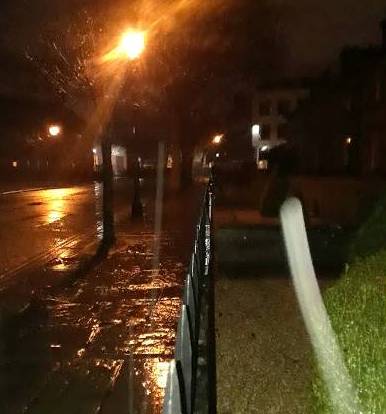
Her chest constrained in broad straps, one arm bound in a tight black band, the other tied by the hand, the crime victim sits in the windowless basement, looks at the man and tries to remember to breathe normally.
Her heartbeat spurts out in jagged red…
But this is not the scene of the crime.
This is the interview afterwards.
Welcome to the next stage of our efforts to get the truth straight from people’s minds: the first in which Science takes a hand.
Around the turn of last century, just as our man Byrnes was on the wane, several advances in tehnology conspired to enable monitoring of the inner workings of our bodies in real time. Investigators – scientific and otherwise – couldn’t resist the chance to take a peek at how, exactly, our involuntary metabolism reacted to the various emotions and stresses of real life.
Early Heath-Robinson (or to use the more local, American term – Rube Goldberg) attempts led to the ‘cardio-pneumo psychograph’ developed by John Augustus Larson, the first individual in American law-enforcement to hold a Ph.D.
His guinea-pigs, in the spring of 1921, were a cohort of young college girls accused of petty theft. The case became a media sensation.
Thus the concept of the ‘Lie Detector’ was born.
The device used in the USA today monitors breathing rate using bands round the chest and stomach (top two lines in the illustration), skin conductance (dampness of skin – smooth green line) and instantaneous blood pressure, hence also heart rate – red jagged line.
Stress ‘tells’ in the person being monitored include raised blood pressure and heart rate, raised skin conductance, and irregularity in breathing. Certain kinds of stress ‘tells’ – but not all – are taken to be signs that the subject is grappling with the process of telling a lie: a more complex business, the polygraph’s underlying philosophy assumes, than simply allowing the truth to come out.
Two ‘pre-tests’ are carried out before any serious questions are asked.
First, the interviewer chats with the subject about their past. From this, information is gleaned that can be used to devise ‘Control’ questions – questions which any normal person would like to lie about. For example, “Have you ever stolen anything from your workplace?”
Second, once the pick-ups are in place, the interviewee is asked to tell a deliberate lie. This usually involves them writing down a number and then having to conceal which number it is in the face of simple yes-no questions.
Most people think the questions in the main session come in two types: Relevant, and ‘Control’.
But there’s more.
Both Relevant and ‘Control’ questions are designed to put our subject on the spot, but in different ways. The Relevant questions refer to the particular crime being investigated and are assumed more stressful if the subject is lying, whereas the ‘Control’ questions are assumed just plain stressful regardless – the subject either has to lie, or to admit some misdeed in their past.
A third type of question, ‘Irrelevant’ – the type most people believe to be ‘Control’ questions – are those which are easily answered without lying. For example: ‘Are the lights on in here?’
So far so good. Under these conditions a guilty interviewee will generally, short of having mastered some arcane technique of body self-control, not be mistaken for innocent.
But here are you: you’re innocent, and you never lie – or at least, not about anything that matters. You’ve been picked up in error and you’re telling the truth without much sign of nerves. The lie-detector works, right? Else they wouldn’t use it.
Then this happens:
‘Did you hide the blood-stained dagger in the shrubbery?’
‘No.’
(after a long silence)
‘The polygraph says that you are lying.’
Your stress-levels go through the roof. And you know full well they’ll be showing on the traces behind you – the traces you, as an American citizen, have been brought up to believe never make mistakes.
What are you to do, now?
Do you cave and change your answer? Lie, and say you’re guilty?
Or do you double down on what you originally said, thus betraying a lack of faith in your country, its technology and its fairness?
Your thoughts twist in knots. A term whose origin is an old word for ‘twisting’ might come to mind. It may occur to you that no other country uses polygraphs – why does yours? You might even happen to know that the guilty party among those college girls was never found, the intense questioning into her personal life precipitated a nervous breakdown in one of the ‘suspects’, and that Dr. Larson, horrified by what his invention had spawned, went on to refer to it as ‘Frankenstein’s Monster’.
You might not believe it, but this last way of using the Polygraph – making false statements to the interviewee – forms part of the next ‘step’ in the erratic progress towards Portsmouth, and Kate.


